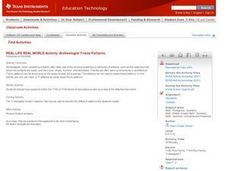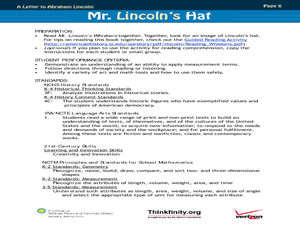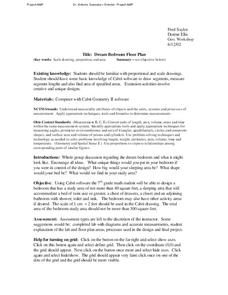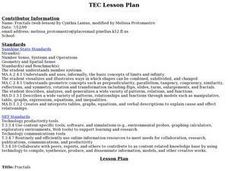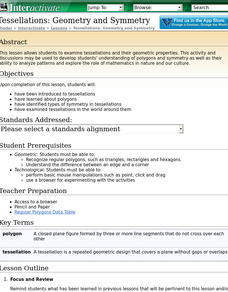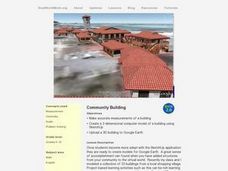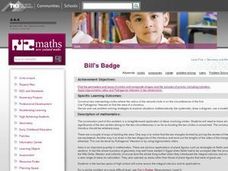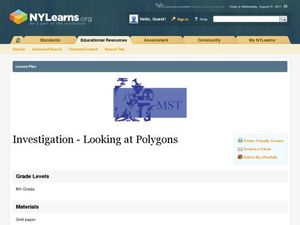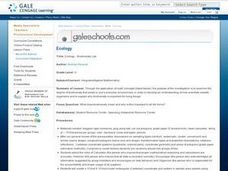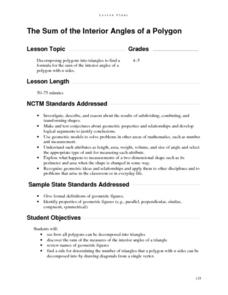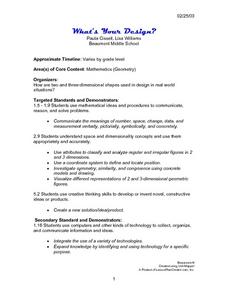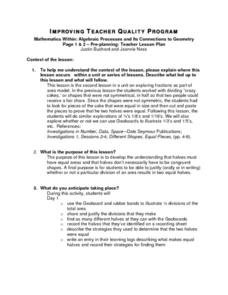Curated OER
Archeologist Frieze Patterns
Learners construct frieze patterns using translations and rotations. They will discuss how frieze patterns are similar to jigsaw puzzles and use Cabri Jr. to build a triangle frieze pattern using rotations, translations, and reflections.
Curated OER
Perfectly Puzzling Pentominoes
Second graders utilize manipulatives (pentominoes) to demonstrate knowledge of: lines of symmetry, slides, reflections (flips), rotations (turns), area, and perimeter. This lesson gives students a meaningful way to practice these...
Curated OER
Mr. Lincoln's Hat
Bring out the inner artist with this Abraham Lincoln lesson. Elementary young scholars work on a home project creating a hat similar to Abraham Lincoln's hat. They will use geometry and measurement to create the scale of the hat, then...
Curated OER
Dream Bedroom Floor Plan
Students construct using Cabri software. In this geometry instructional activity, students convert between units and apply the correct measurements to build objects. They create the room virtually and manipulate the shapes to the desired...
Curated OER
Dream Bedroom Floor Plan
Students build and apply concepts of geometry. In this geometry lesson, students create a building using proportions and scale drawings. They use Cabri technology to create a virtual drawing first.
Curated OER
Measuring Angles
Third graders describe an amount of turn from a particular position to another using the 'circular' benchmarks of 0, ++, ++, ++, and full turn. Estimation language such as 'just about', 'between', 'not quite', 'just over', and similar...
Curated OER
What are Fractals?
Middle and high schoolers identify and analyze fractals and research information using the Internet to locate information about them. They look at fractals in relation to nature and other real world situations. Pupils create several...
Curated OER
Geometry and Symmetry
Students examine tessellations and their geometric properties. The lesson plan and discussions may be used to develop students' understanding of polygons and symmetry as well as their ability to analyze patterns.
Curated OER
Measuring the Earth
Young scholars identify types of arcs and angles in a circle, find the measure of arcs and angles, and solve real world problems involving lengths of segments in circles, lengths, and areas.
Curated OER
Parallel-o-Home
High schoolers investigate the usage of parallel and perpendicular shapes in the real world. In this geometry activity, students investigate shapes for properties that are related to the real world. They relate all the properties of...
Curated OER
Incredible Edible Bridges
Students create a bridge using engineering and geometric concepts. In this geometry lesson, students identify the missing measures of polygons sides and angles. They work together to solve real life situation using problem solving...
Curated OER
Perimeter
Students examine the concept of perimeter. Students calculate the perimeter of a random shape on a grid. Students develop a better understanding of the concept of perimeter. Students calculate the perimeter of shapes.
Curated OER
Snowflake Curve
Students develop an appreciation for complex structures in nature. They observe patterns in nature in relationship to the Real World. Students use observation skills to assist in problem solving. They show comprehension of the concepts...
Curated OER
Community Building
Students build different shapes using sketches. In this geometry lesson, students explore measurements and units as they build and create models of buildings. They use SketchUp to create and manipulate shapes.
Curated OER
The Mandelbrot Set
Students are introduced to the notion of a complex number and function iteration in order to motivate the discussion of Julia sets and the Mandelbrot set.
Curated OER
Bill's Badge
Learners explore the making of circles and concepts related to them in geometry. The project is inquiry based will focus upon students making their own nametags. The construction is ideal for hands on learners.
Curated OER
SuperShapes, Part 1; "Tri"ing Triangles
An outstanding lesson on triangles awaits your math scholars. Learners focus on the triangle, which is the strongest of all polygons. They see the role that triangles play in the design of buildings, and learn about triangle...
NY Learns
Investigation - Looking at Polygons
Middle schoolers construct polygons by plotting points on a coordinate plane. Pupils connect the points and identify which polygons they have drawn. They will need graph paper to carry out the assigned activities. A vocabulary list,...
Curated OER
Ecology - Biodiversity Lab
Studnents examine the degree of biodiversity that exists in one's everyday environment, in order to develop an understanding of how scientists classify organisms and to explain why biodiversity is important for living things.
Improving Measurement and Geometry in Elementary Schools
The Sum of the Interior Angles of a Polygon
Junior geometers discover that polygons can be decomposed into triangles and that the number of triangles can be determined by a rule. Note that the Geometer’s Sketchpad® software is required to carry out all components of this...
Curated OER
Principles of Flight: Flying Paper Airplanes
Students investigate ways to enhance an object's flying ability. In this model construction lesson, students construct two paper airplanes, one of which is twice as big as the first. Students compare and contrast the two...
Curated OER
What's Your Design?
Sixth grade students: design a stained glass window, submitting their initial plan detailing the measurements of all lines and angles. Seventh grade students: create a scale drawing of their own geometric family of four members.
Curated OER
Fractions and Halves
Fourth graders examine halves of a whole and discover through activities that they must be exactly equal in size. Working with Geoboards and Dot-Paper Squares, the class practices finding halves that are both congruent and incongruent.
Curated OER
Translations, Reflections, and Rotations
Students are introduced to the concepts of translation, reflection, and rotation. They practice translating, reflecting, and rotating two-dimensional objects on the coordinate plane. students use computers to learn about the three concepts.
